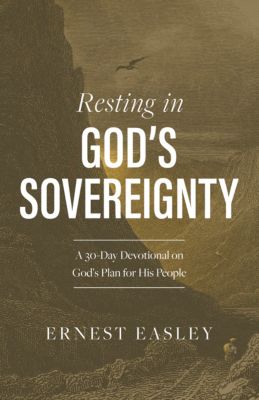
You will never experience the contentment and rest found in God’s sovereignty without first experiencing redemption.
By Ernest Easley
Without persistence or tenacity, you will never learn the joy of resting in God’s sovereignty. So, where does that inner drive come from that keeps us in the saddle when the horse we’re riding starts to buck? What gave Paul the tenacity to not quit, to push through his challenges and reach the point of saying, “In any and all circumstances I have learned the secret of being content” (Philippians 4:12b, CSB)?
What does he mean by, “content”? How did that happen in his life? More importantly, how do we, like Paul, become content in whatever circumstances we find ourselves?
The Greek word translated as “content” has several shades of meaning. It comes from a word meaning “to suffice.” It’s used in 2 Corinthians 9:8 where it’s translated, “having everything you need” (CSB) or more literally, “self-sufficiency.” It speaks of having enough.
Thayer’s Greek-English Lexicon of the New Testament defines it as “possessing enough to need no aid or support.” The New Linguistic and Exegetical Key to the Greek New Testament says, “The word indicates independence of external circumstances and often means of the state of one who supports himself without aid from others.”
Everything needed for contentment
Let me see if I can put this together so we can understand what it means to be “content.” When Paul said, “In any and all circumstances I have learned the secret of being content,” he was saying, “I have learned to be self-sufficient.” You may say, “That doesn’t sound right. In fact, it sounds a little arrogant and humanistic.” Then let me try again to clear it up. How about this: “I have everything within me to be content. I don’t depend upon anything on the outside to satisfy me. I carry my own sufficiency with me on the inside.”
Still confused? Then, let me ask you this: What inner sufficiency did Paul possess that enabled him to be content in all his circumstances or to rest in God’s sovereignty? It was the presence and peace of Jesus Christ living in him!
It wasn’t the circumstances around him that brought him contentment; it was Christ in him. Here’s how Paul said it in 1 Timothy 6:6: “But godliness with contentment is great gain” (CSB). Do you see it? It wasn’t any outside assistant that brought him contentment, it was his inside assistant that brought him contentment: Jesus! With Jesus living within him, he had everything he needed for contentment.
Do you know what contentment really is? As someone once said, “It’s not getting what you want but wanting what you already have. Contentment will make a poor man rich. And discontentment will make a rich man poor.”
Sometimes it is God’s grace that we don’t receive what we think we want.
“Sometimes it is God’s grace that we don’t receive what we think we want.” — @ErnestLEasley Click To TweetYour circumstances reveal your contentment
What did Paul possess that he no longer required any external circumstances to be content in all his circumstances? The answer and secret are found in verse 13: “I am able to do all things through him who strengthens me” (Philippians 4:13, CSB). Do you see it? Contentment or resting in God’s sovereignty is something you learn if you don’t quit too soon and then live. Your circumstances reveal your contentment.
When I discovered I had a fast-growing malignant cancer in my throat, I remember praying one day: “Lord, I know nothing can get to me without first going through you. I know you’re not caught off guard by this. You’ve been preparing me for 40 years to fight this battle. So, I thank you for the cancer. I know you’re going to use it in my life for good and for your glory. I know I’m in your hands. However this turns out, I trust you.”
In that moment, I knew I was resting in God’s sovereignty. I had everything I needed within me, namely Jesus Christ, to rest or be content. Again, your circumstances reveal your contentment.
Are you resting or resisting God’s sovereignty? You say, “How do I know if I’m resting or resisting God’s sovereignty? Here’s how:
Resting in God’s sovereignty produces peace.
Resisting God’s sovereignty produces worry.
And let me add that your resting or resisting His sovereignty doesn’t alter His sovereignty. Fighting Him or having faith in Him doesn’t change His sovereignty. Let me say it another way.
Running toward His sovereignty leads to contentment.
Running away from His sovereignty leads to discontentment.
“Resting in God’s sovereignty produces peace. Resisting God’s sovereignty produces worry. Running toward His sovereignty leads to contentment. Running away from His sovereignty leads to discontentment.” — @ErnestLEasley Click To TweetResting in God’s sovereignty
Paul learned the secret to living in contentment was by surrendering to God’s sovereignty. Listen to him again in Philippians 4:12b-13, “In any and all circumstances I have learned the secret of being content—whether well fed or hungry, whether in abundance or in need. I am able to do all things through him who strengthens me” (CSB).
If I was going to take a picture of resting in God’s sovereignty, here’s how it would look:
- Peace, not panic
- Calm, not conflict
- Trust, not trouble
- Faith, not fear
- Rest, not restlessness
Are you resting in or resisting the sovereignty of God? The way to get more of God is for God to get more of you. The more God gets of you, the more you get of God. Here’s more good news:
First, resting in His sovereignty is the secret to living a satisfied life. Second, if you are redeemed, you can rest.
Do you have health issues? If you’re redeemed, you can rest!
Do you have challenging circumstances? If you’re redeemed, you can rest!
Do you not have all the answers? If you’re redeemed, you can rest!
You will never experience the rest found in God’s sovereignty without first experiencing redemption. Redemption is found at the cross of Jesus, who bled and died, was buried, and then arose from the dead on the third day making redemption available to you.
Let the redeemed learn to rest in God’s sovereignty!
This article is excerpted with permission from Resting in God’s Sovereignty (B&H, 2024).

Ernest Easley
For permission to republish this article, contact Marissa Postell Sullivan.












